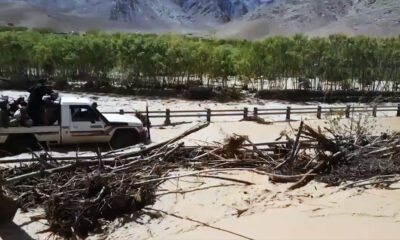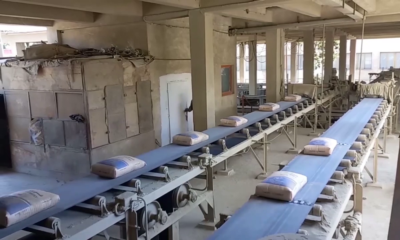World
Azerbaijan halts Karabakh offensive after ceasefire deal with Armenian separatists
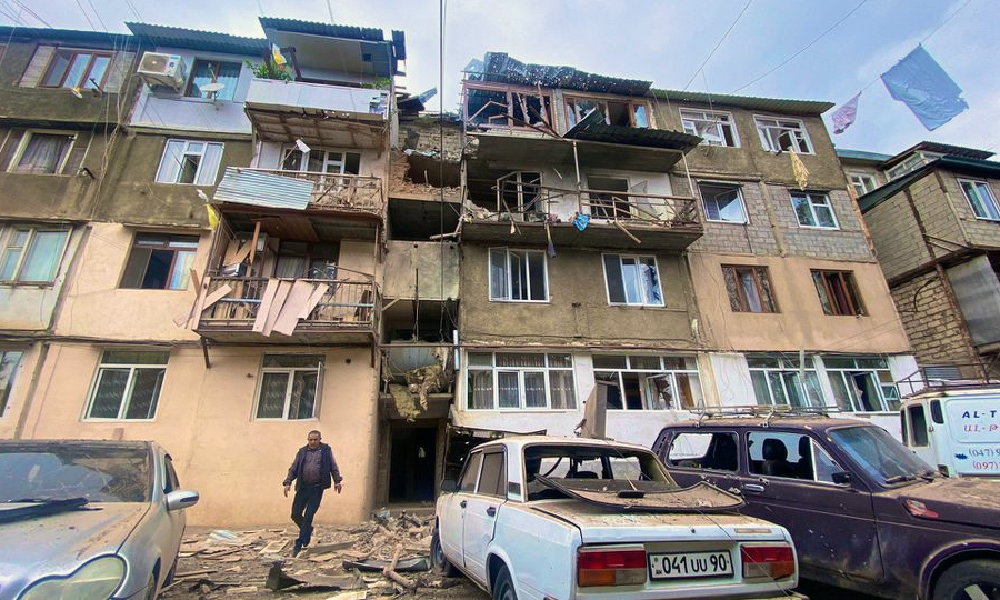
Azerbaijan said on Wednesday it had halted military action in its breakaway region of Nagorno-Karabakh after its battlefield success forced Armenian separatist forces to agree to a ceasefire that will see the area fully return to Baku’s control, Reuters reported.
Under the agreement, outlined by Azerbaijan and the Russian Defence Ministry, which has peacekeepers on the ground, separatist forces are meant to disband and disarm, while talks on the future of ethnic Armenians who live there are due to start on Thursday.
In a speech to the nation on Wednesday evening, Azerbaijani President Ilham Aliyev said Baku had restored its sovereignty “with an iron fist” in a 24-hour offensive by troops backed by artillery strikes that brought the breakaway region to heel.
He said Armenian forces had begun handing over their weapons and leaving, and that Karabakh’s 120,000 Armenians would be able to take part in Azerbaijani elections, receive state education, and freely practice their Christianity in his Muslim-majority nation.
“We will turn Karabakh into paradise,” said Aliyev, who said he was a man of his word.
Karabakh, a mountainous area in the volatile wider South Caucasus region, is internationally recognised as Azerbaijani territory, but part of it has been run by separatist Armenian authorities since a war that ended in the early 1990s.
Armenians claim a long historical dominance in the area, which they call Artsakh. Azerbaijan links its historical identity to the territory too.
Fearful of what the future might hold, thousands of Armenians massed at the airport in Stepanakert, the capital of Karabakh known as Khankendi by Azeris. Others took shelter with Russian peacekeepers in the hope of being flown out.
As Karabakh has been the focus of two wars since the 1991 fall of the Soviet Union, many of its Armenians deeply distrust Azerbaijan. Neighbouring Armenia has accused Baku of trying to ethnically cleanse the territory, something Baku denies.
“They are basically saying to us that we need to leave, not stay here, or accept that this is a part of Azerbaijan – this is basically a typical ethnical cleansing operation,” Ruben Vardanyan, a former top official in Karabakh’s ethnic Armenian administration, told Reuters.
Another separatist Armenian official said at least 200 people had been killed in the fighting and more than 400 wounded. He said 10 of those killed were civilians, of whom five were children. Reuters could not verify his assertion.
The victory for Azerbaijan, whose forces far outnumbered the separatists and which is backed by Turkey, could cause political turmoil in neighbouring Armenia, where some political forces are angry that the government was unable to do more to protect the Karabakh Armeniansm, read the report.
Armenian Prime Minister Nikol Pashinyan is already facing calls from some opponents to resign and thousands of protesters gathered in the Armenian capital on Wednesday evening to demand that the government do more for the Karabakh Armenians.
Some of them yelled “Nikol is a traitor!”.
Others are furious that Russia, which has peacekeepers on the ground and helped broker an earlier ceasefire deal in 2020 following a 44-day war, did not stop Azerbaijan.
The Kremlin rejected that criticism on Wednesday and President Vladimir Putin was quoted as saying that Russian peacekeepers, some of whom were killed on Wednesday when their car was shot at, would protect Karabakh’s civilian population, Reuters reported.
But Moscow has not criticised Baku. Describing a phone call between Putin and Pashinyan, the Kremlin said Putin “noted with satisfaction that it was possible to overcome the acute phase of the conflict, and welcomed the agreement … on a complete cessation of hostilities and the holding of negotiations on Sept. 21”.
Separatists running the self-styled “Republic of Artsakh” said they had been forced to agree to Azerbaijan’s terms – relayed by Russian peacekeepers – after Baku’s army broke through their lines and seized strategic locations.
Azerbaijan had said it could no longer tolerate a situation it regarded as a threat to its security and territorial sovereignty.
Separatist fighters were expected to leave Karabakh for Armenia after handing over their tanks and artillery to Russian peacekeepers, though some of them figure on an Azerbaijani wanted list and are likely to be arrested.
Armenia, which says it has no forces in Karabakh despite Azerbaijani assertions, did not intervene militarily – something that Aliyev said he appreciated.
It was unclear how many ethnic Armenians would opt to stay in Karabakh, Reuters reported.
Russia’s defence ministry, which has thousands of peacekeepers on the ground, broadcast footage of Karabakh Armenians being given temporary shelter at a makeshift Russian military facility.
Armenian Deputy Foreign Minister Paruyr Hovhannissyan told Reuters that Karabakh Armenians could “in an ideal world” live under Azerbaijani rule but that historical experience made it hard to imagine.
Azerbaijan’s military operation had faced sharp criticism from the United States and some European countries.
They said the Karabakh problem should have been solved through talks and that Baku’s actions were worsening an already dire humanitarian situation on the ground following a nine-month blockade of the area by Azerbaijan that caused acute shortages of food and other staples.
World
Blinken arrives in Saudi Arabia to discuss Israel normalization, post-war Gaza
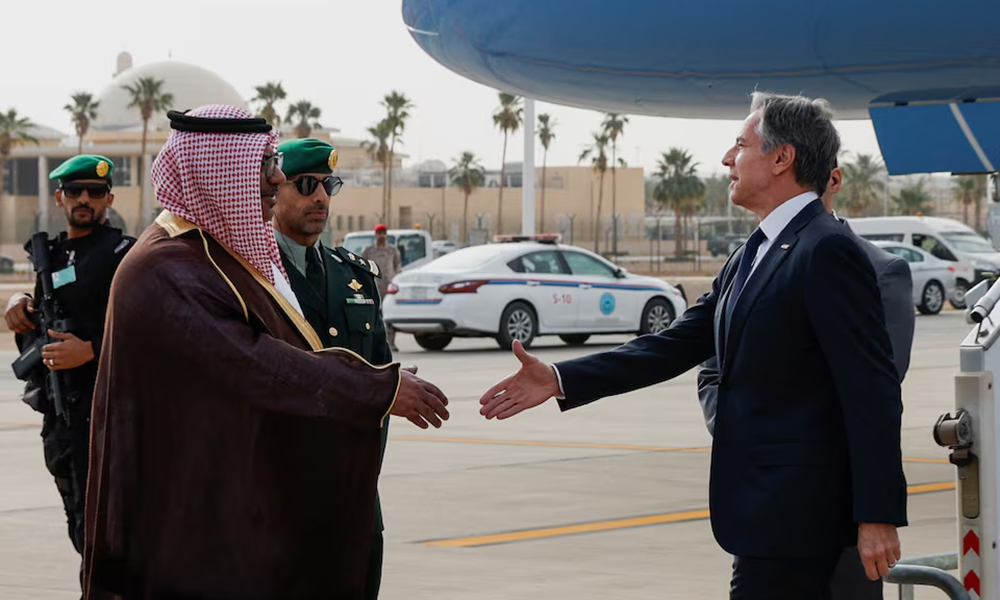
U.S. Secretary of State Antony Blinken arrived in Saudi Arabia on Monday, the first stop in a broader trip to the Middle East to discuss issues including the governance of Gaza once the war with Israel ends.
The top U.S. diplomat heads to Israel later this week, where he is expected to press Israeli Prime Minister Benjamin Netanyahu to take the concrete and tangible steps U.S. President Joe Biden demanded this month to improve the dire humanitarian situation in Gaza.
In Riyadh, Blinken is expected to meet with senior Saudi leaders and hold a wider meeting with counterparts from five Arab states – Qatar, Egypt, Saudi Arabia, the United Arab Emirates and Jordan – to further the discussions on what governance of the Gaza Strip would look like after the war, according to a senior State Department official.
Blinken is also expected to bring together Arab countries with the European states and discuss how Europe can help the rebuilding effort of the tiny enclave, which has been reduced to a wasteland in the six-month long Israeli bombardment.
A group of European nations, including Norway, plan to recognise Palestinian statehood in conjunction with the presentation of an Arab state-backed peace plan to the United Nations.
“We can see by joining forces we can make this more meaningful. We really want to recognise the Palestinian state, but we know that is something you do once,” Norwegian Foreign Minister Espen Barth Eide told Reuters on the sidelines of a World Economic Forum meeting in Riyadh.
Blinkin’s trip comes as Egypt was expected to host leaders of the Islamist group Hamas to discuss prospects for a ceasefire agreement with Israel.
Hamas fighters attacked Israel on Oct. 7, killing 1,200 people and seizing 253 hostages, according to Israeli tallies.
Israel retaliated by imposing a total siege on Gaza, then launching an air and ground assault that has killed more than 34,000 Palestinians, say health authorities in Hamas-ruled Gaza.
Conversations over Gaza’s rebuilding and governance have been going on for months with a clear mechanism yet to emerge.
The United States agrees with Israel’s objective that Hamas needs to be eradicated and can no longer play a role in Gaza’s future but Washington does not want Israel to re-occupy the strip.
Instead, it has been looking at a structure that will include a reformed Palestinian Authority with support from Arab states.
Blinken will also discuss with Saudi authorities the efforts for a normalization deal between the kingdom and Israel, a mega deal that includes Washington giving Riyadh agreements on bilateral defense and security commitments as well as nuclear cooperation. – REUTERS
World
Police arrest scores of pro-Palestinian protesters on US university campuses
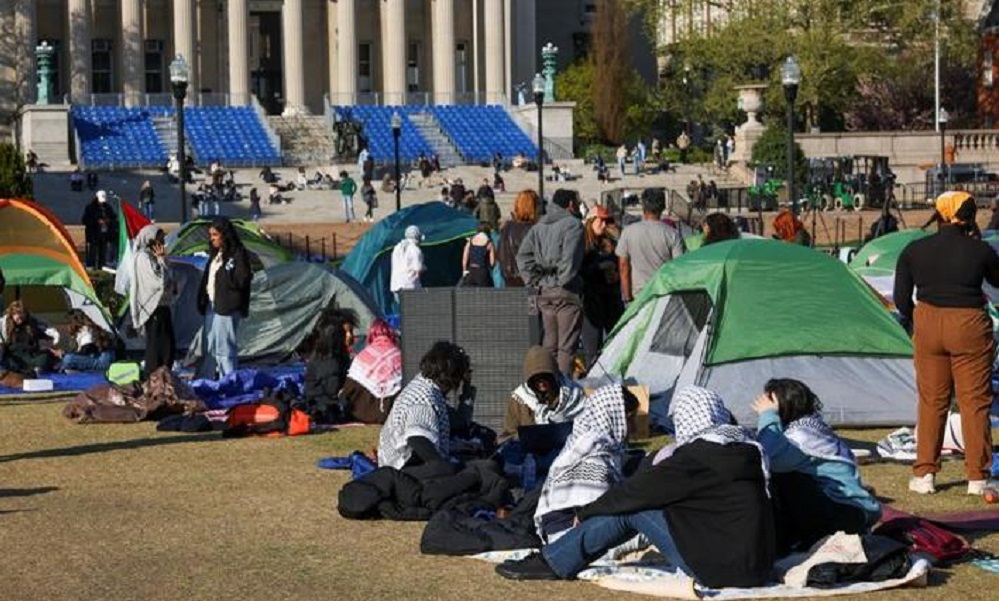
Pro-Palestinian protesters were arrested on a handful of U.S. university campuses on Saturday, as activists vowed to keep up the movement seeking a ceasefire in Israel’s war with Hamas among other demands.
The Indiana University police department in Bloomington said in an emailed statement that 23 protesters were arrested there.
Indiana State Police along with Indiana University police told demonstrators they could not pitch tents and camp on campus. When the tents were not removed, police arrested and transported protesters to the Monroe County Justice Center on charges of criminal trespass and resisting arrest.
“The Indiana University Police Department continues to support peaceful protests on campus that follow university policy,” the police statement read.
Pro-Palestinian protests have spread to college campuses across the U.S., stoked by the mass arrest of over 100 people on Columbia University’s campus last week.
In addition to a ceasefire, protesters are demanding that their schools divest from companies involved with Israel’s military and seeking an end to U.S. military assistance for Israel along with amnesty for students and faculty members who have been disciplined or fired for protesting.
School leaders at several universities have responded in the past week by asking police to clear out camps and arrest those who refuse to leave. While saying they defend free speech rights to protest, the leaders say they will not abide activists infringing on campus policies against hate speech or camping out on university grounds.
Massachusetts State Police said in a statement that they helped clear out a protest encampment at Northeastern University in Boston and that 102 protesters who refused to leave were arrested and will be charged with trespassing.
Northeastern University said in a statement on social media that it decided to call in police as “what began as a student demonstration two days ago was infiltrated by professional organizers with no affiliation to Northeastern.”
At Arizona State University, campus police arrested 69 protesters early Saturday, the school said in a statement.
The university said “a group of people – most of whom were not ASU students, faculty or staff – created an encampment and demonstration” and were arrested and charged with criminal trespass after refusing to disperse. – REUTERS
World
Hamas says it received Israel’s response to its ceasefire proposal
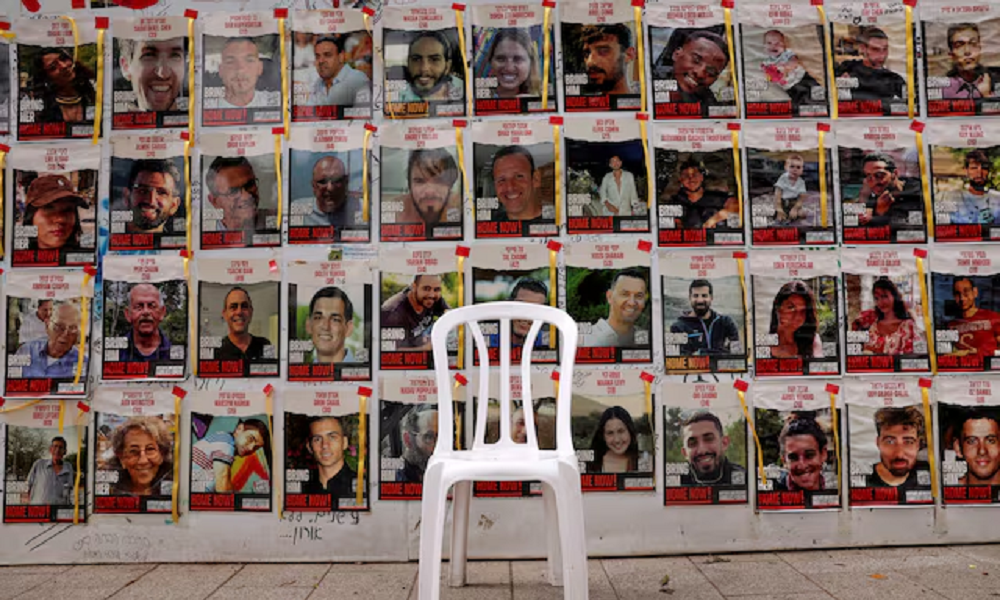
Hamas said it had received on Saturday Israel’s official response to its latest ceasefire proposal and will study it before submitting its reply, the group’s deputy Gaza chief said in a statement.
“Hamas has received today the official response of the Zionist occupation to the proposal presented to the Egyptian and the Qatari mediators on April 13,” Khalil Al-Hayya, who is currently based in Qatar, said in a statement published by the group.
After more than six months of war with Israel in Gaza, the negotiations remain deadlocked, with Hamas sticking to its demands that any agreement must end the war.
An Egyptian delegation visited Israel for discussion with Israeli officials on Friday, looking for a way to restart talks to end the conflict and return remaining hostages taken when Hamas fighters stormed into Israeli towns on Oct. 7, an official briefed on the meetings said.
The official, who spoke on condition of anonymity, said Israel had no new proposals to make, although it was willing to consider a limited truce in which 33 hostages would be released by Hamas, instead of the 40 previously under discussion.
On Thursday, the United States and 17 other countries appealed to Hamas to release all of its hostages as a pathway to end the crisis.
Hamas has vowed not to relent to international pressure but in a statement it issued on Friday it said it was “open to any ideas or proposals that take into account the needs and rights of our people”.
However, it stuck to its key demands that Israel has rejected, and criticised the joint statement issued by the U.S and others for not calling for a permanent ceasefire and the withdrawal of Israeli forces from Gaza.
White House national security adviser Jake Sullivan said on Friday he saw fresh momentum in talks to end the war and return the remaining hostages.
Citing two Israeli officials, Axios reported that Israel told the Egyptian mediators on Friday that it was ready to give hostage negotiations “one last chance” to reach a deal with Hamas before moving forward with an invasion of Rafah, the last refuge for around a million Palestinians who fled Israeli forces further north in Gaza earlier in the war.
Meanwhile, in Rafah, Palestinian health officials said an Israeli air strike on a house killed at least five people and wounded others.
Hamas fighters stormed into Israeli towns on Oct. 7, killing 1,200 people and capturing 253 hostages. Israel has sworn to annihilate Hamas in an onslaught that has killed more than 34,000 Palestinians.
-

 Latest News5 days ago
Latest News5 days agoOver 1,000 Afghan refugees forced out of Pakistan in one day
-

 Sport3 days ago
Sport3 days agoAfghanistan beat Iraq 5-3, inch closer to Futsal World Cup berth
-

 Regional3 days ago
Regional3 days agoNew UK sanctions target Iranian drone industry
-

 Regional4 days ago
Regional4 days agoTurkey accuses U.S. of double standards over Gaza in rights report
-

 Latest News3 days ago
Latest News3 days agoEU allocates 17 million euros to support Afghans on the move
-

 Latest News2 days ago
Latest News2 days agoPakistan extends registered Afghan refugees’ stay till June 30
-

 World4 days ago
World4 days agoUS student protests over Gaza intensify despite arrests
-

 Regional2 days ago
Regional2 days agoChina to host Hamas, Fatah for Palestinian unity talks






